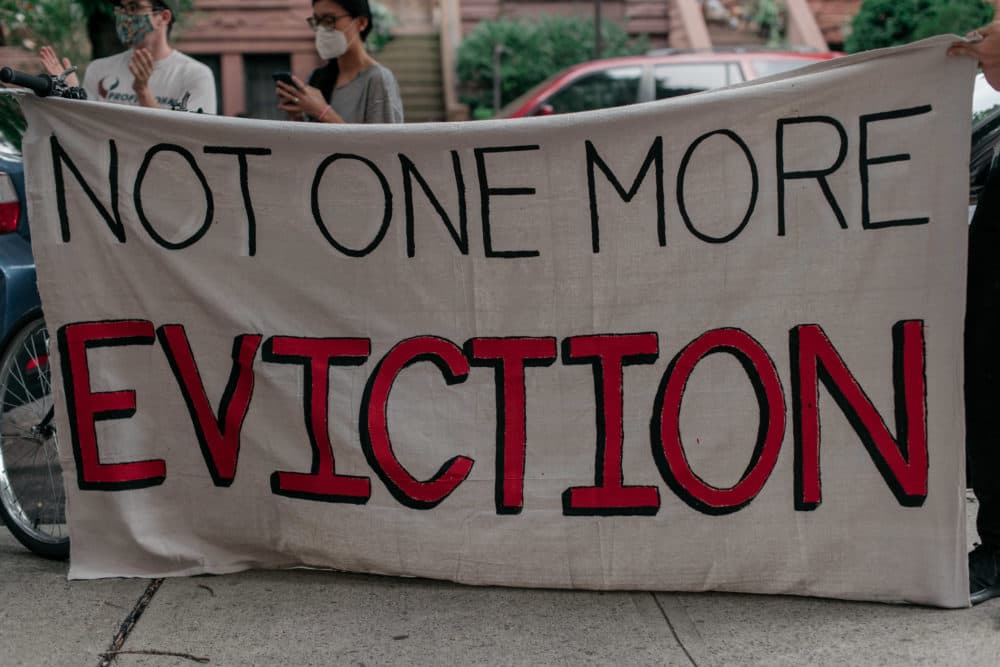Advertisement
Millions Of Americans Face Eviction As Housing Protections Expire
Resume
As the first of the month approaches, many renters will come up short on rent as a result of the economic impacts of the COVID-19 pandemic.
The economic devastation of the coronavirus pandemic has put as many as 40 million people at risk of eviction by the end of the year, according to the National Low Income Housing Coalition. A federal ban on evictions from public housing ended in July, and many state and local protections for all renters are expiring soon.

In Marion, Ohio, a place with no special protections against eviction, Jacque Sayre went on unemployment in March after she was laid off from her job at a hotel when the pandemic hit. Without the additional $600 in federal assistance “keeping everything alive,” she says she now receives $219 per week in unemployment benefits — which isn’t enough to pay her $675 a month rent, car payment, insurance and electric bill.
“One month I try to pay my rent, one month I try to make my car payment,” she says. “And so I'm just juggling from month to month. It's just very stressful not knowing what's going to happen.”
Sayre says she's trying to work something out with her landlord, who has already evicted some of her neighbors. But she says it's hard to see how she'll get by unless lawmakers pass some sort of rent relief.
As long as the pandemic continues, she thinks people will need assistance with rent, even if it’s a direct payment to landlords or mortgage relief.
In California, a moratorium on courts processing evictions expires Tuesday. With further protections tied up in the state legislature, it's unclear what tenant protections are still in place.
Anne Orchier, a 33-year-old marketing freelancer in Los Angeles, says keeping up with all of the changes on the city, county, state and federal levels is a full-time job. Inspired by the growing tenants’ rights movement calling for the cancelation of rent, she and her neighbors formed a tenants association.
The group came together for a meeting in their backyard to share how the pandemic has impacted them from affording food to paying rent, she says.
“So many of us were on the brink before,” she says. “And so the pandemic really pushed things over the edge and just like created this new layer of uncertainty.”
With more than $1,000 in rent owed to her landlord, Orchier says her neighbors have become a source of comfort and strength through this difficult time. When she receives a letter or any communication from her landlord, she feels afraid because of the power dynamic.
“If we're talking about one-on-one, this is the person who has the power to decide if I have a home or not,” she says. “That's really scary. My initial instinct is to feel fear, and that changes as soon as I talk to one of my neighbors.”
In Kenner, Louisiana, where evictions resumed in June, mother of seven Christian Cowans left her home of 18 years before her landlord officially filed for an eviction. She says she left because she knew she couldn’t pay and didn’t want to go to court, leaving her homeless for one or two weeks.
“Of course, I didn't have my kids at the time, but I was pretty much living on the streets,” she says. “I've never been in that predicament before, but I made the best of it.”
Once her unemployment came through, she could afford a hotel room but still struggles with food and other expenses.
Before COVID-19, Cowans worked as a self-employed house cleaner — but she lost all of her clients because of the pandemic. Now, she says her unemployment benefits come out to $107 per week.
Thanks to some temporary rental assistance, she says she found a new home in a trailer but needs to pay the coming month’s rent by Sept. 19. Unless she finds a job soon, she could face eviction again.
In spite of everything, Cowans remains hopeful. She says she even checks in on people she knows who are struggling, including her former landlady whose property she was forced to leave. Cowans calls her a friend and knows she is also suffering during this pandemic.
“No matter how big COVID-19 wants to be, it's not going to come and tear friendship and family apart with me,” she says. “You know, even though I'm in the boat I'm in, I'm still looking to help other people because there's a lot of people that need help.”
Eviction bans are set to expire in eight more states by the end of September.
Chris Bentley and Cristina Kim produced and edited this interview for broadcast with Todd Mundt. Allison Hagan adapted it for the web.
This segment aired on August 31, 2020.



